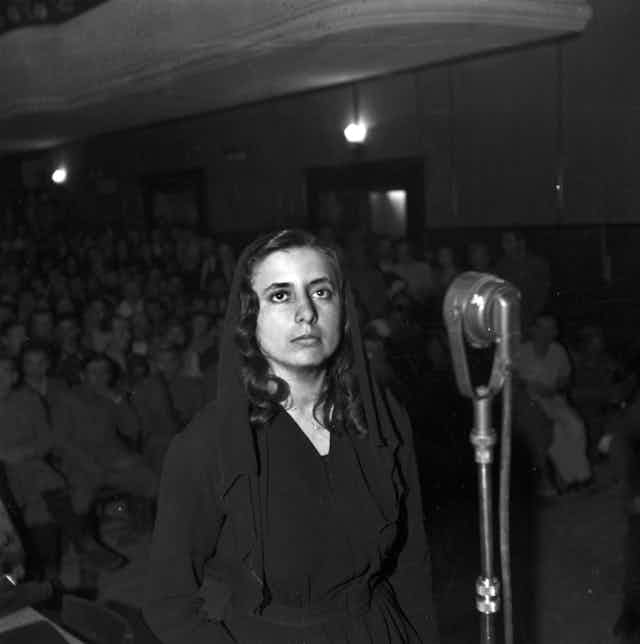Musine Kokalari was an Albanian writer and political dissident. She was imprisoned and suffered the humiliation of a public show trial under a despotic regime which murdered her brothers and kept her under surveillance and in exile most of her life. Her brave story can now be told after secret police files were released that revealed details about a shocking miscarriage of justice which deprived the world of a great writer.
Kokalari was Albania’s first female writer of note from the pre-communist period. She was born in 1917 in Adana, Turkey, where from an early age the young Musine showed a passion for literature and national folklore. The Kokalari family were at the centre of literary and political activity.
They returned to their native Gjirokastra in southern Albania in 1920. In 1938 Kokalari embarked on university studies in literature at La Sapienza University, Rome. She kept a diary, My University Life, which was published in 2016. Then in 1941, she published her first book called, As My Grandma Says. The book is about the daily struggles of a Gjirokastran woman living in a deeply patriarchal society and can be seen as an early feminist text.
The writer and political dissident

It was during her studies that Kokalari joined anti-fascist and anti-communist movements. She continued her political activities upon her return to Albania in 1942 where she co-founded the Albanian Social Democratic Party. Her brother’s bookshop became a hub of intellectual activity. As a result the family was kept under close surveillance by the communist authorities (represented by the National Liberation Movement/National Liberation Front). Two of her brothers, Vesim and Muntaz, were executed by the state for their political activities. Kokalari herself was detained and arrested several times in 1945 after openly expressing her views against totalitarianism.
She was then involved in the Democratic Coalition, a political movement that supported the postponement of elections and for multi-party elections. The writer hoped that representatives from the United Kingdom and the United States would monitor the elections. But all 37 members of the coalition were arrested and deemed traitors of the Albanian nation. Neither the US nor the UK intervened.
Hair torn from her head
In 1946, Kokalari stood before the military court in the Albanian capital, Tirana. She was threatened, intimidated and coerced. Archival memos refer to her hair being torn out of her head by bystanders. Her trial was transmitted live via loud speakers to the crowds outside. Her stoic stance is illustrated in a photograph taken by the Albanian Telegraphic Agency. In defiance she wore a mourning veil in memory of her executed brothers. Her powerful image made the front page of the broadsheets in Albania two days running.
This trial was the second in a run of six organised by the authorities from that period that effectively eliminated “enemies of the state”. It was dubbed the “political dissidents trial” and it sent a message about the direction that the regime was taking towards free speech. It did not stop Kokalari. She used the trial to stand up for her rights. Witness accounts speak of her declaring: “I do not need to be a communist to love my country”. Despite her bravery, she would have endured severe, prolonged torture during her detention and trial. The court refused to let her speak for any length of time.
Kokalari was sentenced to 20 years imprisonment, of which she served 16. She spent a further period of exile in northern Albania, where she worked as a manual labourer. She joked that she was a “mortar specialist” as her work involved heavy, arduous construction. On her days off she would visit the library and sit in a public place reading a book under the watchful eye of the secret police. Despite the fact that she was forbidden to write, she secretly completed a manuscript about the founding of the Social Democratic Movement. Kokalari died in 1983 – two years before the decline of the dictatorship – after being refused treatment for cancer by the Albanian government.

The fragile rule of law
The near full isolation imposed on her by the communist authorities denied Albanian society and the wider world her powerful voice and writings. Kokalari’s writing tapped into local custom and language, using local dialects in a lucid way, as she wrote about the challenges facing her generation of women. Her broader outlook about her country’s future as a democracy is far from outdated. At its core the protection of free speech as a key to participating in and contributing to civil society should serve to remind us how democracies are still works in progress. Her trial and the trials of her contemporaries show how fragile the rule of law can be.
In April 2015 the Albanian parliament passed a law permitting individuals to access their secret police or Sigurimi files. In 2017 the Kokalari family was presented with the file that the Sigurimi kept on her. Within it they found the powerful and defiant photograph of the writer standing alone in front a crowd of people as she was put on trial for her beliefs (main image). Kokalari is evidence of a political dissident voice in a country with little experience with democracy and which existed in near isolation for most of the 20th century. It continues to struggle with its communist past.
It is a timely moment, in Kokalari’s centenary year, to reflect on the contribution that this remarkable woman made to Albania’s cultural and political life. Her life story is a poignant tale of achievement and ambition, of hope in the face of repression and also inspiration – for Albanians and non-Albanians alike.

